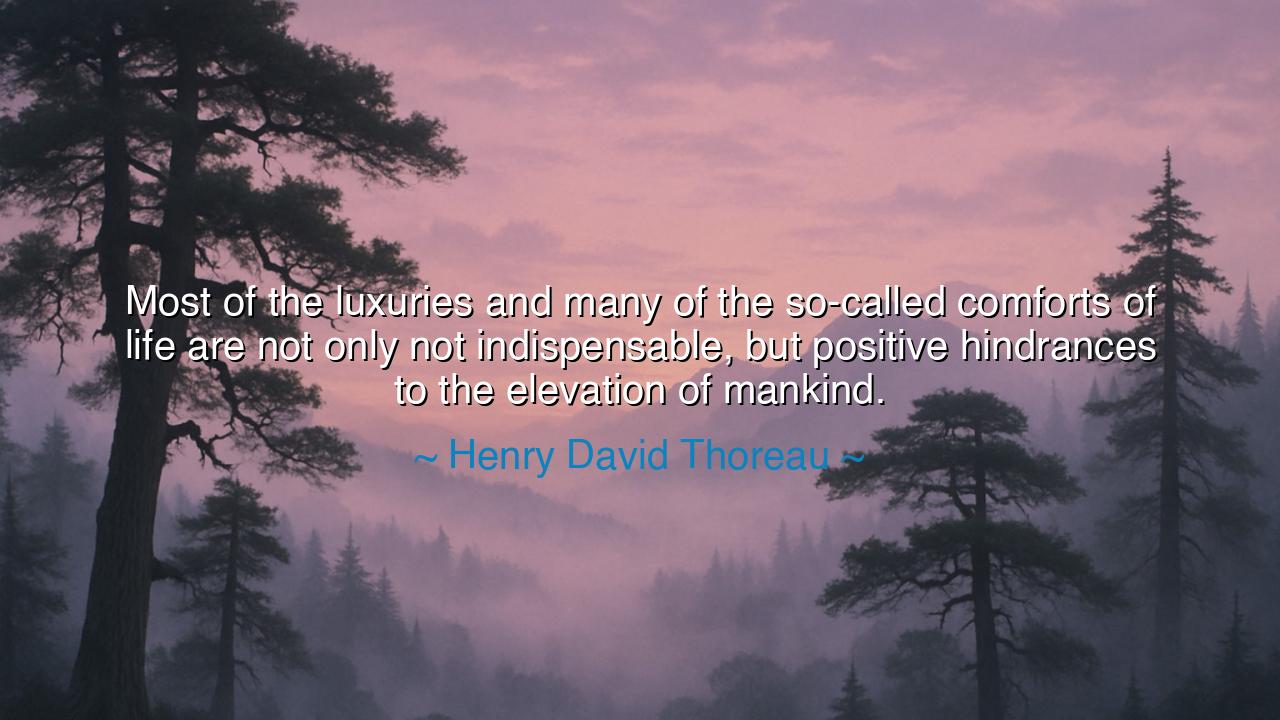
Most of the luxuries and many of the so-called comforts of life
Most of the luxuries and many of the so-called comforts of life are not only not indispensable, but positive hindrances to the elevation of mankind.






The words of Henry David Thoreau—“Most of the luxuries and many of the so-called comforts of life are not only not indispensable, but positive hindrances to the elevation of mankind.”—strike like a bell across the ages, calling us to remember what truly strengthens the human soul. Here, Thoreau, the sage of Walden Pond, reminds us that the treasures of life are not found in silks, gold, or indulgence, but in simplicity, discipline, and closeness to truth. The luxuries that men chase, far from liberating them, often bind them; the comforts they prize, far from nourishing them, often weaken their spirit.
The ancients understood this truth and wove it into their philosophies. The Stoic Epictetus declared that he who is enslaved to wealth and ease is poorer than the beggar who governs his own desires. The Spartans, too, lived with austerity, training their bodies and wills to reject softness so that their spirits would be unyielding. In these traditions we see the same teaching: that the hindrances to greatness are not poverty or hardship, but the false comforts that lull men into complacency.
History shows us this principle vividly. Consider the fall of Rome: once a republic of strength and discipline, it grew decadent with feasts, games, and indulgence. Citizens who once sacrificed for the common good became slaves to their comforts, and in that weakness, corruption spread, and the empire decayed. Contrast this with the pilgrims who crossed oceans in fragile ships, enduring hunger and cold, yet forged new communities with resilience and vision. Their strength was born of necessity, of stripping away what was not essential so that they might cling only to what truly mattered.
Thoreau himself lived this teaching in his retreat to Walden Pond. He built his small cabin with his own hands, grew his own food, and lived with few possessions. By rejecting the luxuries that society insisted were needed, he found freedom of thought, clarity of spirit, and communion with nature. His words remind us that sometimes abundance is not a blessing, but a burden, and that the truest elevation comes from simplicity, not excess.
Yet his teaching is not a call to reject all joy or beauty. Rather, it is a call to discernment: to ask whether what we own and pursue serves our growth or stifles it. A soft bed may bring rest, but if it breeds laziness, it is no blessing. Wealth may buy convenience, but if it deadens our compassion and dulls our will, it is a curse. Thus, Thoreau calls us to examine our lives, to strip away that which chains us, and to cherish that which strengthens us.
The lesson for us is clear: seek not to fill your life with endless things, but to fill your soul with strength, wisdom, and virtue. Question the comforts you cling to, and ask whether they serve your highest purpose. Be willing to endure hardship if it brings growth, and reject indulgence if it brings decay. For the path of greatness is not lined with velvet, but carved in the rough stone of discipline.
So, dear listener, let Thoreau’s words awaken you. Do not be deceived by the glitter of luxury or the seduction of comfort. Instead, embrace simplicity, endure hardship, and seek the treasures of character, wisdom, and truth. For it is not ease that elevates mankind, but the struggle that sharpens the spirit, the sacrifice that strengthens the will, and the simplicity that frees the soul. In this way, you too may rise, unencumbered, toward the heights of human greatness.






TSNguyen Thi Soa
I find this thought-provoking because it reframes our understanding of necessity and luxury. Could the very comforts we chase create complacency, limiting ambition or empathy? At the same time, denying all luxuries might be unrealistic for most people. I’d like a perspective on how to define what is genuinely indispensable versus superfluous, and how to cultivate simplicity in a way that promotes self-improvement and contributes meaningfully to society without resorting to extreme asceticism.
BNPham Vo Bao Nam
This statement makes me question the role of consumerism in shaping human priorities. Are people today more focused on accumulating possessions than cultivating virtues or wisdom? I also wonder if some so-called hindrances might actually facilitate elevation, such as access to education or technology disguised as luxury. How do we discern between indulgences that stifle growth and resources that empower it? I’d like a discussion on practical applications of Thoreau’s philosophy in contemporary life.
Y2Nhu Y 24.
Reading this, I feel a tension between practicality and idealism. While some luxuries may seem unnecessary, many comforts improve quality of life and allow people to focus on higher pursuits. Could Thoreau’s critique be more about mindset than material objects themselves? I’d like a perspective on how individuals can navigate modern life—balancing the benefits of comfort with the risk of complacency or distraction from personal and societal growth.
DTDuong Tlinh
This quote challenges modern assumptions about progress and material wealth. Could the pursuit of comfort and luxury actually distract people from personal growth or social responsibility? I wonder how Thoreau’s perspective applies in today’s consumer-driven society, where convenience is often prioritized over reflection, creativity, or meaningful work. Are there ways to enjoy comfort without it becoming a hindrance to intellectual, moral, or spiritual development, or is renunciation the only path to true elevation?